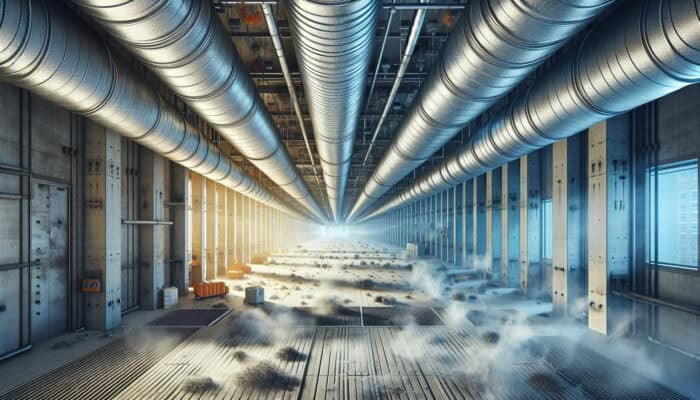Explore the Importance of Regular Duct Cleaning for Your Business Success
Why Is Duct Cleaning Essential for Optimising Your Business Operations?

Commercial Duct Cleaning Services in Vancouver: Regular duct cleaning is critical for maintaining excellent air quality in bustling commercial environments like Vancouver. Over time, airborne particles such as dust, allergens, and various pollutants can accumulate in duct systems, presenting substantial health risks to all individuals within these spaces. Poor air quality often leads to respiratory issues, exacerbated allergies, and other health complications that can negatively affect both employees and clients. Furthermore, ensuring that ducts remain clean significantly extends the lifespan of HVAC systems, preventing unnecessary wear and tear on the equipment. By adhering to a regular cleaning schedule, businesses can vastly improve their working environment and promote overall wellness.
In commercial settings where numerous individuals interact, the build-up of dust and contaminants can become particularly pronounced. This concern is particularly urgent in densely populated urban areas, where pollution levels are often elevated or where construction activities are prevalent. Clean ducts ensure optimal airflow and temperature regulation, which are essential for maintaining employee comfort and productivity. Moreover, routine duct cleaning reduces fire hazards since dust accumulation can be combustible. Thus, duct cleaning is not merely a maintenance task; it is an essential measure for enhancing health and safety.
Uncover the Major Benefits of Maintaining Clean Ducts in Commercial Spaces
Keeping ducts clean offers numerous advantages that significantly influence both the health and operational efficiency of commercial environments. One of the most substantial benefits is the enhancement of air circulation. When ducts are free from dust and debris, air can flow unimpeded, leading to improved indoor air quality. This fosters a healthier environment for both employees and clients, often resulting in fewer sick days and an increase in overall morale. Additionally, clean ducts lead to reduced energy costs; when HVAC systems operate without the obstruction of grime, they function more efficiently, which translates into noticeable savings on energy bills over time.
Moreover, businesses that prioritise duct cleanliness tend to enjoy a competitive edge in attracting customers. A well-maintained and spotless environment is more inviting, translating into enhanced customer satisfaction. Depending on the industry, clean ducts may also significantly reduce allergen and pollutant levels, thereby improving health outcomes for sensitive individuals. In a commercial context, the array of advantages linked to clean ducts plays a pivotal role in boosting both operational efficiency and customer satisfaction.
How Often Should You Schedule Duct Cleaning for Optimal Effectiveness?
For the majority of commercial duct systems, experts generally advise scheduling cleaning every 3 to 5 years. However, this timeframe can vary based on multiple factors, including the nature of the business, the volume of foot traffic, and local environmental conditions. For instance, restaurants or facilities positioned near active construction sites may experience elevated dust levels, necessitating more frequent cleaning. Conversely, offices in less populated areas might determine that a 5-year cleaning cycle suffices.
Regular maintenance not only helps prevent dust accumulation but also facilitates the early detection of potential issues. Monitoring the condition of the ducts can inform business owners when cleaning is necessary, ensuring that high air quality is consistently maintained. Implementing a routine inspection schedule allows professionals to evaluate air quality and duct conditions, enabling informed decisions regarding cleaning frequency. By proactively managing duct cleanliness, businesses can ensure a healthier work environment and enhance the efficiency of their HVAC systems.
In-Depth Overview of Commercial Duct Cleaning Services in Vancouver

What Techniques Are Commonly Used in Professional Duct Cleaning Services?
In Vancouver, a range of effective techniques are employed for commercial duct cleaning to ensure thorough removal of dust and contaminants. Common methods include:
- Rotary brush cleaning
- Compressed air cleaning
- Vacuum systems
- Hydro-excavation
- Brush and vacuum combination
- Negative air pressure cleaning
- Whip cleaning technology
- Inspection via video cameras
Each of these methods presents distinct advantages tailored to address the specific needs of various commercial spaces. For example, rotary brush cleaning utilises mechanical brushes to scrub the interior surfaces of ducts, effectively dislodging debris. Compressed air cleaning employs high-pressure air to expel contaminants, while vacuum systems capture particles to prevent them from re-entering the environment. The utilisation of a variety of techniques allows duct cleaning professionals to customise their approach based on the unique challenges presented by each business.
Furthermore, the choice of cleaning method may depend on the type and age of the ductwork. Older systems might necessitate gentler techniques to avoid damage, whereas newer installations may benefit from more aggressive cleaning methods. Businesses should clearly communicate their specific requirements to duct cleaning professionals to ensure the most effective techniques are utilised.
How Can Businesses Ensure They Receive Premium Duct Cleaning Services?
To ensure high-quality duct cleaning services in Vancouver, businesses should adopt several proactive strategies. Firstly, verifying the certifications and qualifications of the cleaning service is crucial. Seek out industry-recognised certifications, such as those from the National Air Duct Cleaners Association (NADCA). These certifications indicate that service providers adhere to industry standards and best practices.
Reading customer reviews offers valuable insights into service quality. Look for feedback concerning punctuality, professionalism, and effectiveness in previous jobs. Additionally, requesting references from the service provider can further assess their reputation. A reputable duct cleaning service will be willing to provide references and examples of past client experiences. Furthermore, confirming that the service is insured and carries liability coverage is vital, as it protects businesses from potential damages that may arise during the cleaning process.
Finally, obtaining a detailed written estimate before the work commences is essential. This document should delineate the scope of work, expected outcomes, and pricing. Transparent service providers will ensure that all potential costs are discussed upfront. By following these guidelines, businesses can secure reputable and high-quality duct cleaning services tailored to their specific needs.
What Are the Warning Signs of Inadequate Duct Maintenance?

Recognising the signs of insufficient duct maintenance is crucial for sustaining a healthy commercial environment. Common indicators include visible dust and debris around air vents, signalling that contaminants are circulating throughout the duct system. Additionally, the presence of mould growth inside ducts presents a serious health risk, potentially leading to severe health complications for occupants. Unusual odours, particularly musty or damp smells emanating from vents, often indicate the presence of mould or other pollutants, suggesting that immediate duct care is necessary.
Frequent occurrences of allergies or respiratory issues among staff can also serve as a warning signal. If a notable number of employees report increased allergy symptoms, it may be time to inspect the duct system. An increase in dust settling on surfaces within the business premises can indicate ineffective duct operation. Conducting regular inspections can help identify these issues early, reducing severe health risks and ensuring a consistently clean air supply.
Comprehensive Understanding of the Duct Cleaning Process
What Are the Stages Involved in a Detailed Duct Cleaning Procedure?
The duct cleaning process is a structured and systematic approach aimed at eliminating dust, allergens, and other harmful contaminants. Initially, a comprehensive inspection is carried out to assess the condition of the ductwork. This often involves using video cameras to provide real-time visuals of the interiors. After evaluating the level of contamination, specialised equipment is deployed to effectively clean the ducts.
The cleaning procedure incorporates various methods, including powerful vacuums and brushes, to dislodge and remove debris. This approach ensures that all pollutants are filtered out of the air before they can recirculate within the building. Once the cleaning is complete, a final verification check is conducted to confirm that the ducts are free from debris and contaminants. This structured methodology guarantees that businesses receive the highest standards of duct cleaning.
Moreover, the process may also include sanitisation where necessary, to eliminate any residual bacteria or mould. This step is especially crucial in settings such as hospitals or food service establishments, where hygiene is paramount. By adhering to a meticulous and methodical process, duct cleaning services can ensure a healthier and cleaner environment for commercial spaces.
What Equipment Is Essential for Effective Duct Cleaning?
Commercial duct cleaning relies on specialised tools designed to ensure thorough cleaning and effective removal of dust. Essential equipment includes HEPA-filtered vacuums, which capture fine particles and prevent them from re-entering the air supply. These vacuums play a significant role in maintaining air quality both during and after the cleaning process.
Additionally, rotary brushes are often employed to scrub the duct walls, efficiently dislodging dirt and contaminants. Air whips serve as another effective tool, utilising compressed air to blow dust out of hard-to-reach areas. Some services may utilise negative air pressure systems, which create a vacuum effect to draw pollutants from the ducts as they are disturbed. The use of high-quality tools ensures that the cleaning process is efficient and thorough, minimising disruptions to commercial operations.
For inspections, video camera systems empower technicians to visually assess the interior of the ducts, identifying problem areas before cleaning begins. This technology enhances service quality by providing clients with clear evidence of the duct’s condition. Such advanced equipment is vital in ensuring that duct cleaning services in Vancouver meet the highest standards of effectiveness and customer satisfaction.
How Long Does a Standard Duct Cleaning Session Typically Take?
The duration of a standard duct cleaning session can vary significantly based on several factors. Generally, the cleaning process takes anywhere from 2 to 6 hours, depending on the size and complexity of the duct system. Larger commercial spaces with extensive ductwork may require additional time to ensure that all areas are thoroughly cleaned and disinfected.
The extent of contamination also greatly influences the duration. If ducts are heavily soiled, more time may be necessary to ensure a comprehensive and effective cleaning. Additionally, the type of cleaning methods employed can impact the time required; for example, rotary brush cleaning might take longer than vacuum-only methods. Businesses should be mindful of these factors when scheduling duct cleaning services.
Scheduling duct cleaning during off-peak hours can help minimise disruptions to business operations. This strategic planning allows duct cleaning technicians to work efficiently without time constraints, ensuring that the service is completed thoroughly and effectively. By understanding the variables influencing the duration of duct cleaning, businesses can better plan and allocate resources for this essential maintenance task.
How Frequently Should Duct Cleaning Be Scheduled for Peak Performance?
As previously discussed, ducts should typically be cleaned every 3 to 5 years. However, this frequency can differ based on the unique conditions of each business. High-traffic environments, such as retail stores and medical facilities, often require more frequent cleanings to maintain optimal air quality. Furthermore, businesses located in areas with higher levels of air pollution may need to schedule cleanings more often.
Establishing a routine maintenance schedule is beneficial for businesses, allowing for periodic inspections to evaluate the ducts' condition. This proactive strategy helps identify issues early on, ensuring that air quality remains high. Additionally, monitoring the performance of the HVAC system can provide insights into duct cleanliness; if the system struggles to maintain temperature or airflow, it may indicate the necessity for cleaning. Regular maintenance not only enhances air quality but also extends the lifespan of HVAC systems.
What Are the Key Benefits of Duct Cleaning?
The advantages of duct cleaning are extensive, contributing to both improved health and increased efficiency in commercial settings. One of the most significant benefits is the enhancement of indoor air quality. By removing dust, allergens, and pollutants, businesses can create a healthier environment for both employees and customers. This improvement often leads to fewer health complaints and an overall increase in well-being.
In addition to health benefits, duct cleaning can also enhance HVAC efficiency. Cleaner ducts enable HVAC systems to operate more effectively, leading to reduced energy costs. This efficiency not only saves money but also lessens the environmental impact of the business. Clean ducts can also improve the performance of heating and cooling systems, ensuring consistent temperature regulation throughout the premises.
Furthermore, regular duct cleaning can lead to potential savings on maintenance costs. By preventing the accumulation of contaminants, businesses can avoid more significant issues that may arise from neglected ductwork. With these tangible benefits, investing in regular duct cleaning is a wise decision for any commercial operation.
Strategic Approaches for Selecting Commercial Duct Cleaning Services in Vancouver
How to Choose the Most Appropriate Duct Cleaning Service for Your Unique Needs?
Selecting the right duct cleaning service is crucial for ensuring quality and customer satisfaction. Start by researching local services in Vancouver, focusing on their experience and reputation. Look for companies that boast a long-standing presence in the industry, as this often reflects reliability and expertise.
Certifications are essential; confirm that the service provider is accredited by recognised organisations such as NADCA. These certifications demonstrate a commitment to industry standards and best practices. Reading customer reviews is also an invaluable step; feedback from previous clients can illuminate the strengths and weaknesses of potential service providers. Moreover, obtaining quotes from multiple companies allows for a comparison of services and pricing, leading to a well-informed decision.
A reputable duct cleaning service should conduct a thorough examination of your duct system before providing a quote. This assessment helps identify specific needs and potential issues, ensuring that the service is tailored to the unique conditions of the business. Transparency in pricing is also critical; a trustworthy service will clearly outline all costs involved without any hidden fees. By adhering to these guidelines, businesses can select a qualified and dependable duct cleaning service in Vancouver.
What Are the Best Practices for Duct Maintenance?
Implementing best practices for duct maintenance is essential for prolonging the lifespan and efficiency of HVAC systems. Regular inspections are crucial; having a professional evaluate the ducts at least once a year can help identify issues before they escalate. These inspections should focus on signs of debris accumulation, mould growth, and the overall condition of the ducts.
Timely cleaning is another best practice. While a cleaning schedule of every 3 to 5 years is generally advisable, this can be adjusted based on specific environmental factors. Additionally, ensuring proper ventilation helps prevent moisture accumulation, which is vital for avoiding mould and bacterial growth within the ducts. Regularly changing air filters and maintaining HVAC systems will also assist in keeping ducts clean and improving air quality. By adhering to these best practices, businesses can ensure that their ducts remain efficient and effective in delivering clean air.
How Does Duct Cleaning Enhance Overall Business Operations?
Clean ducts significantly contribute to enhancing overall business operations. By maintaining high air quality, businesses can reduce the frequency of sick days taken by employees, leading to increased productivity. Moreover, clean air elevates employee morale, as individuals typically perform better in a healthy environment.
Furthermore, clean ducts improve customer experience. In sectors where customer satisfaction is paramount, such as hospitality or retail, maintaining a clean and healthy environment is critical. Customers are more likely to return to establishments where they feel comfortable and enjoy clean air. Additionally, enhanced air quality can lead to fewer complaints and higher overall ratings for the business.
Investing in regular duct cleaning ultimately positions businesses to operate at their best, fostering healthier employees and more satisfied customers. The benefits of clean air extend beyond health, influencing productivity, customer satisfaction, and the overall reputation of the business. By prioritising duct cleaning, businesses can significantly enhance their operational efficiency and market presence.
Examining the Advantages of Commercial Duct Cleaning
How Does Duct Cleaning Improve Indoor Air Quality?
Duct cleaning plays a crucial role in enhancing indoor air quality, particularly in commercial settings. Over time, dust, pollen, and other allergens can accumulate within ductwork, leading to compromised air quality. By implementing regular duct cleaning, these contaminants can be effectively removed, resulting in significantly cleaner air circulating throughout the building. This improvement benefits employees and greatly enhances the overall customer experience, especially in sensitive environments such as hospitals or schools, where air quality is paramount.
Moreover, eliminating pollutants from the ducts reduces the likelihood of respiratory issues and allergic reactions among occupants. Business owners may notice a decline in complaints regarding air quality alongside an overall boost in workplace morale. With enhanced indoor air quality, businesses can create a healthier environment, ultimately leading to happier and more productive employees.
Additionally, routine duct cleaning can help eliminate unpleasant odours and reduce the presence of harmful bacteria and mould. This cleanliness fosters a more pleasant atmosphere, where the air feels invigorating and fresh. As a result, investing in duct cleaning translates to a measurable enhancement in the quality of life within commercial spaces.
Can Duct Cleaning Result in Lower Energy Costs?
Indeed, duct cleaning can significantly reduce energy expenses for businesses. When ducts are clean, HVAC systems do not have to exert as much effort to circulate air. The accumulation of dust and debris creates additional resistance within the system, leading to increased energy consumption and higher costs. By maintaining clean ducts, businesses can enhance the efficiency of their HVAC systems, ultimately resulting in lower energy bills.
Furthermore, improved airflow allows the HVAC system to maintain the desired temperature more effectively, further reducing the energy needed to heat or cool the space. As energy efficiency improves, businesses might experience a noticeable decrease in monthly utility costs, contributing to more manageable operational expenses.
Moreover, energy-efficient operations benefit not only the financial bottom line but also the environment. By lowering energy consumption, businesses can reduce their carbon footprint and promote sustainable practices. In this sense, duct cleaning serves as an investment in both financial health and environmental stewardship.
What Health Benefits Are Associated with Clean Ducts?
Clean ducts offer numerous health benefits that are essential for sustaining a healthy workplace. By removing dust, allergens, and pollutants, duct cleaning significantly reduces the risk of respiratory issues and allergic reactions among employees and customers. A clean air supply fosters a more comfortable environment, which is critical for productivity and overall well-being.
Moreover, minimising the presence of mould and bacteria within the duct system is vital for preventing illness. In environments such as healthcare facilities, where patients are particularly vulnerable, maintaining high air quality is crucial for avoiding complications and ensuring patient safety. The health advantages of clean ducts extend to increased productivity, as employees are less likely to experience fatigue, headaches, or other symptoms associated with poor air quality.
Additionally, clean ducts contribute to a more pleasant atmosphere, enhancing the overall comfort of both staff and customers. This comfort can foster greater satisfaction and loyalty, further benefiting the business. By investing in duct cleaning, companies are prioritising the health and well-being of everyone who enters their facilities.
How Frequently Should Commercial Ducts Be Maintained and Cleaned?
As previously mentioned, commercial ducts should generally be cleaned every 3 to 5 years. However, this timeframe should be adjusted based on the specific needs of the business and environmental factors. For instance, establishments with high foot traffic, such as retail stores or gyms, may require more frequent cleanings to maintain optimal air quality.
In addition to regular cleaning, businesses should implement a monitoring system for air quality and duct conditions. This strategy can help identify when additional cleanings are necessary, ensuring that air quality remains elevated. Furthermore, businesses should be vigilant regarding any changes in their HVAC systems, such as unusual noises or decreased efficiency, as these can signal the need for duct cleaning. By following a proactive maintenance schedule, businesses can ensure that their air quality stays optimal and their HVAC systems operate efficiently.
Understanding Local Regulations and Standards for Duct Cleaning in Vancouver
What Are the Local Regulations Governing Duct Cleaning Practices?
Vancouver has established specific regulations and standards governing duct cleaning services to ensure safety and quality. These regulations may include adherence to local health codes and environmental standards that dictate how duct cleaning services operate within the city. Companies offering duct cleaning must comply with these regulations to maintain their licenses and certifications.
Moreover, local bylaws may require businesses to meet specific air quality standards, especially in sensitive environments such as healthcare facilities, schools, and commercial kitchens. Understanding these regulations is vital for businesses aiming to maintain compliance while ensuring a clean and healthy environment.
In some instances, businesses may also undergo inspections by local health authorities to verify adherence to air quality standards. Duct cleaning services should be well-informed about these regulations and provide businesses with guidance on remaining compliant. By partnering with services that understand local regulations, businesses can ensure that their duct cleaning efforts align with all necessary requirements.
How Do Certifications Impact Duct Cleaning Services?
Certifications are fundamental in ensuring that duct cleaning services adhere to industry standards and best practices. Organisations such as the National Air Duct Cleaners Association (NADCA) provide certifications that indicate a commitment to excellence within the duct cleaning sector. Services that hold these certifications signify their expertise and adherence to established guidelines, offering businesses peace of mind when selecting duct cleaning services.
Utilising certified services allows businesses to expect a higher level of professionalism and quality in the work performed. Certified technicians undergo training in the latest techniques and possess the necessary tools to ensure thorough cleaning. Moreover, certifications can also reassure businesses of compliance with local regulations, thereby enhancing the credibility of the service.
Choosing a certified duct cleaning service represents an investment in the long-term health of the business’s HVAC system and indoor air quality. By collaborating with certified professionals, businesses can trust they are receiving high-quality services that meet the highest industry standards.
What Key Elements Should Businesses Review in a Duct Cleaning Contract?
When evaluating a duct cleaning contract, businesses should ensure that it is comprehensive and clearly outlines all terms and conditions. A solid contract should specify the scope of work, detailing exactly what services will be performed during the cleaning process. This includes a thorough description of the techniques and equipment that will be used, as well as the expected results.
Furthermore, businesses should confirm whether the duct cleaning service offers any warranties or guarantees. This assurance indicates that the service provider stands behind their work and is dedicated to customer satisfaction. Clear terms regarding pricing, including any additional fees or charges, should also be included to avoid surprises later on.
Additionally, the contract should outline the responsibilities of both parties, including any preparations that the business must undertake before service. This may involve clearing areas around vents or ensuring easy access to duct systems. By thoroughly reviewing and comprehending the contract, businesses can engage with a reputable and transparent duct cleaning service.
Frequently Asked Questions (FAQs)
How often should commercial ducts be cleaned?
Ducts should typically be cleaned every 3 to 5 years, although this frequency may vary depending on factors such as foot traffic and environmental conditions.
What methods are utilised for duct cleaning?
Common methods include rotary brush cleaning, compressed air cleaning, and vacuum systems, each tailored to specific cleaning needs.
What are the signs of inadequate duct maintenance?
Indicators include visible dust around vents, unusual odours, mould growth, and frequent respiratory issues among occupants.
Can duct cleaning enhance employee productivity?
Yes, clean ducts contribute to better air quality, reducing sick days and enhancing overall employee morale and productivity.
Are there any regulations governing duct cleaning in the Vancouver area?
Yes, local regulations exist to ensure safety and quality, particularly in sensitive environments such as healthcare facilities.
What should I look for in a duct cleaning service?
Consider experience, certifications, customer reviews, and transparency in pricing when choosing a duct cleaning service.
How long does a typical duct cleaning take?
A typical duct cleaning can take anywhere from 2 to 6 hours, depending on the size and condition of the duct system.
What equipment is used for duct cleaning?
Equipment includes HEPA-filtered vacuums, rotary brushes, air whips, and negative air pressure systems, designed for effective cleaning.
What health benefits arise from clean ducts?
Clean ducts reduce allergens and pollutants, lowering the risk of respiratory problems and improving overall health for occupants.
Can duct cleaning lower energy costs?
Absolutely, clean ducts enable HVAC systems to operate more efficiently, leading to significant energy savings for businesses.
Connect with us on Facebook!
Presented By: Commercial Duct Cleaning in Vancouver
The Article: Commercial Duct Cleaning Services in Vancouver First Published On: https://pacificbluemechanical.ca/
The Article Commercial Duct Cleaning in Vancouver: Expert Solutions Was Found On https://limitsofstrategy.com
The Article Commercial Duct Cleaning Solutions: Experts in Vancouver found first on https://electroquench.com


